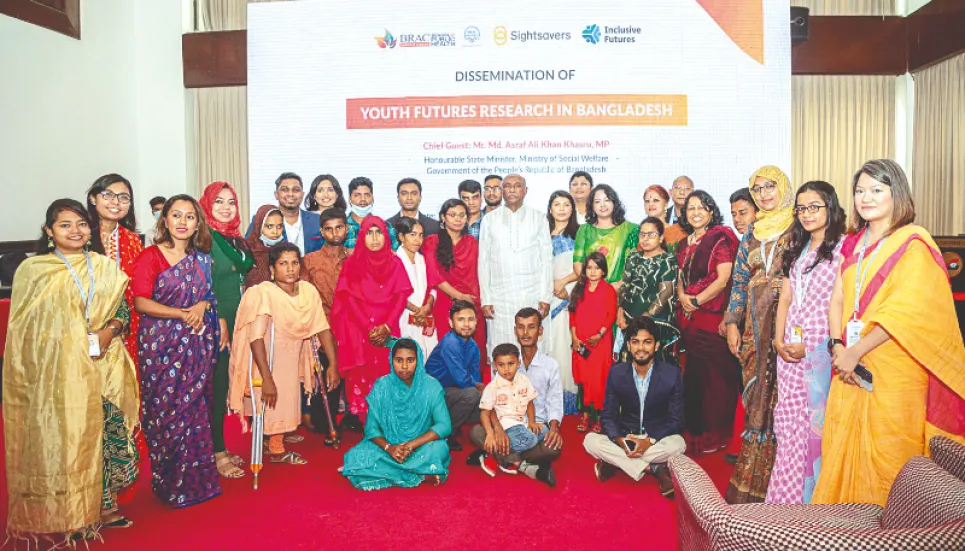
Youth with disabilities face multifaceted challenges in terms of equal livelihood, employment and inclusive education and are often denied their rights as per the Disability Act 2013, recent research stated.
A joint research project by Sightsavers & BRAC University titled “British Academy Youth Futures Research” captured the experiences of young people with disabilities living in urban and rural settings in Bangladesh.
Researchers from both organisations disseminated the project’s findings at an event in Dhaka on Thursday. It was jointly hosted by Sightsavers and BRAC James P Grant School of Public Health.
The team was led by a group of young peer researchers who have disabilities and will be trained and supported to shape national policy on disability inclusion. Their innovative research looked into the challenges, hopes and aspirations of young people with disabilities in Bangladesh.
The research will be proved to be crucial in terms of providing training and support to shape national policy on disability inclusion, speakers at the event stated.
State Minister of the Ministry of Social Welfare Md Ashraf Ali Khan Khasru graced the workshop as the chief guest, and Neuro-Developmental Disability Protection Trustee Board Chairperson Prof Dr Md Golam Rabbani attended the event as a special guest.
This research tried to understand the experiences, aspirations, and challenges of youths with disability in their livelihood in Bangladesh and, to explore the inclusion of young people with disabilities into policy dialogues around the implementation of SDG8: Decent work and economic growth.
It also tried enhancing the advocacy capacity of the youth with disabilities (peer researchers) so that they can advocate with the government and relevant stakeholders for their rights was another key objective of the project.
ALSO READ: Social safety net programme falters
Speaking as the chief guest, Md Ashraf Ali Khan Khasru MP said, “Research is an important component for societal development, and there is no alternative to research for development.”
He praised the research as it helped understand the aspirations of youth with disabilities in relation to livelihoods and determine barriers to realising those aspirations.
Sightsavers Bangladesh Country Director Amrita Rejina Rozario said, “By employing young researchers with disabilities, we got an authentic insight, and the research has also empowered them to help shape and contribute to the policy decisions that affect their lives.
“Sightsavers is committed to advancing the rights of persons with disabilities through research and other development initiatives,” he added.
This study took the form of Community-Based Participatory Research (CBPR) and employed young people with disabilities from Sirajganj, Gazipur and Narsingdi districts as peer researchers who worked alongside local and international researchers to gather and analyse data for the study.
ALSO READ: Budget FY23: Allowance for 3.57 lakh more people with disabilities
“The research has not only made a real difference to understanding the experience of young people with disabilities in Bangladesh but been led by the people who understand these experiences the best”, said Prof Dr Malabika Sarker from BRAC James P Grant School of Public Health who chaired the event.
Dr Mrittika Barua and Sayema Akter from BRAC James P Grant School of Public Health of BRAC University presented the key findings of the research. Dr Sapana Basnet, Senior Research Associate at Sightsavers UK, Khandaker Jahurul Alam, Executive Director of CSID, Zahir Bin Siddique, Country Director of Leonard Cheshire Bangladesh, among others, spoke on various findings of the research at the event.